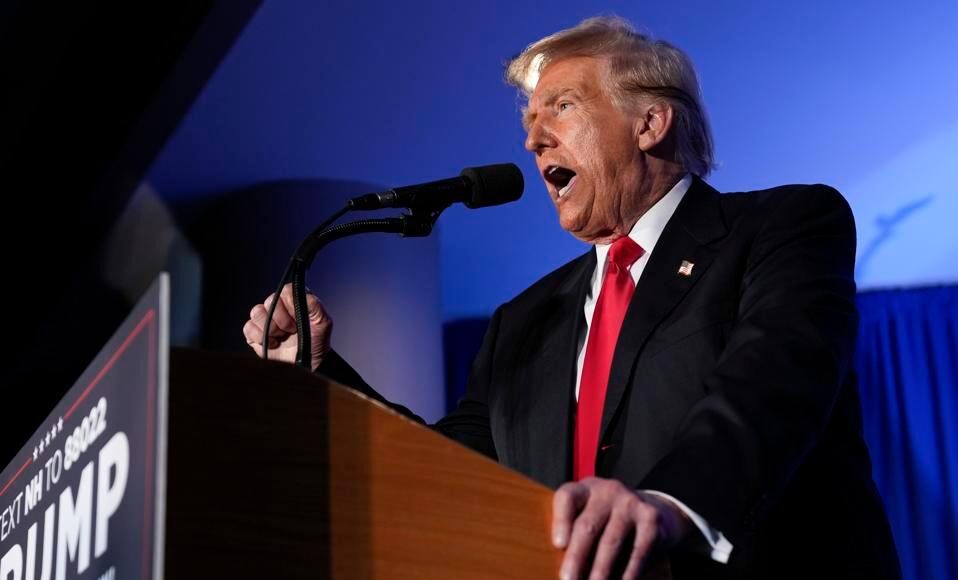Former President Donald Trump suggested on Truth Social early Thursday he believes presidents should be allowed to “cross the line” without legal consequences, as an appeals court prepares to rule on whether he has “immunity” from criminal charges—and after Trump’s attorney suggested in court that presidents could even assassinate political rivals without being charged.
Trump has tried to have criminal charges against him for trying to overturn the 2020 election thrown out on grounds of “presidential immunity,” claiming he should be immune from prosecution for actions he took as part of his presidential duties in the White House.
As a federal appeals court weighs that issue, Trump said on Truth Social he believes presidents should have “FULL IMMUNITY” and would not be able to “PROPERLY FUNCTION” if they didn’t.
“Even events that ‘cross the line’ must fall under total immunity,” Trump claimed, arguing that otherwise there will be “years of trauma trying to determine good from bad.”
The ex-president and 2024 candidate likened the situation to police officers being allowed to perform “strong and effective crime prevention” even though there are “rogue cops,” writing, “Sometimes you just have to live with ‘great but slightly imperfect.’”
Trump’s comments come after his attorney Dean John Sauer took a very expansive view of immunity in court: When judges presented the hypothetical possibility of a president selling military secrets or assassinating political rivals, Sauer argued they could not be criminally charged unless they were first impeached and convicted by the Senate.
Trump didn’t respond to those hypotheticals specifically after the hearing, telling reporters only that he “feel[s] that as a president you have to have immunity, very simple.”
The Justice Department, which brought the federal charges against Trump he’s trying to throw out, has strongly opposed Trump’s expansive view of immunity. DOJ attorney James Pearce described Sauer’s argument in court as presenting “an extraordinarily frightening future.” Accepting that position “would mean that if a former president engages in assassination … and then isn’t impeached and convicted, there is no accountability for that individual,” Pearce told the appeals court in January. “And that is frightening.”
The appeals court could rule at any time on whether to grant Trump’s motion to dismiss the charges against him, which a lower district court judge has already denied. Judges suggested they were skeptical of Trump’s view of presidential immunity when they heard the case in January, though it remains to be seen what their ruling will be. Trump is likely to appeal any ruling against him, saying on Truth Social Thursday, “GOD BLESS THE SUPREME COURT!” The ongoing appeals process has drawn out the federal case against Trump for trying to overturn the 2020 election, as proceedings have been paused while the motion gets appealed. That makes it likely the planned March trial date in the case will get pushed back, though it’s still not clear by how much. Trump is also separately claiming he has “immunity” from state charges in Georgia for trying to overturn the election, but the court has not said yet when it could rule on that.
What Trump will do if he’s elected in November. The former president has suggested he could use his second term to get revenge on his political enemies by appointing DOJ officials who would go after President Joe Biden and other rivals, and the New York Times reported in November that Trump intends to install lawyers who are more likely to go along with legally controversial plans. In a December interview with Sean Hannity, Trump said he only planned to be a “dictator” on “day one” of his presidency, with plans to shut down the U.S.-Mexico border and expand oil drilling. (Trump later defended his comments on Truth Social by saying they were made in a “joking manner.”)
Trump has been indicted on four federal felony charges in the case against him for trying to overturn the 2020 election, one of four criminal cases he now faces. (The ex-president has pleaded not guilty to all the charges against him.) He could be sentenced to prison if convicted. Trump has frequently used the “presidential immunity” defense as legal cases against him have accumulated, claiming immunity in both of the election-related criminal cases against him, along with civil cases seeking to hold him liable for the Jan. 6, 2021, riot and defamation allegations brought by writer E. Jean Carroll. His claims have so far not held up in court, however. Before the federal appeals court took up the case, U.S. District Judge Tanya Chutkan ruled Trump’s criminal charges couldn’t be thrown out, because his time as president doesn’t give him the “divine right of kings to evade the criminal accountability that governs his fellow citizens.” Multiple courts have also shut down his arguments against the civil allegations, with judges ruling Trump’s actions that allegedly incited Jan. 6 weren’t within the scope of his official duties, and thus aren’t eligible for immunity. Whether presidents have immunity from criminal charges is still an unsettled legal question, however. Longstanding DOJ precedent states sitting presidents can’t be indicted on criminal charges and the Supreme Court has ruled presidents are shielded from civil cases arising from their official duties, but the high court has never decided whether former presidents can be criminally charged.
Appeals Court Skeptical Of Trump’s Immunity Claims In Jan. 6 Criminal Case (Forbes)
Is Trump Immune From Criminal Charges? What To Know About ‘Presidential Immunity’ As Appeals Court Hears Jan. 6 Case. (Forbes)









